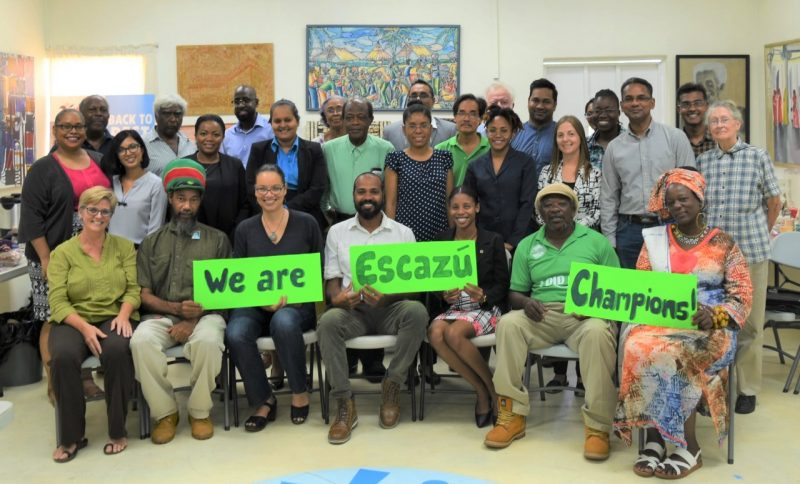
Civil society representatives in Trinidad and Tobago advocating for their country to sign the Escazú Agreement to guarantee access to information and public participation in environmental matters. Photo courtesy Omar Mohammed, used with permission.
This article was originally published on Cari-Bois News. An edited version is republished here as part of a content-sharing agreement with Global Voices.
Citizens of Trinidad and Tobago now have unhindered access to critical information about the environmental and social impacts of development projects on their communities.
This follows a major win for environmental transparency by the watchdog group Fishermen and Friends of the Sea (FFOS), which successfully mounted a legal challenge against the Environmental Management Authority (EMA) in order to gain full access to the findings of Environmental Impact Assessments (EIAs).
The EMA’s website describes an EIA as “a study which identifies the likely effects a specific project may have on the environment and society.” In explaining to the court why they believed that information generated by these studies should not be accessed in full by the public, the EMA claimed that third party copyright restrictions limited them to sharing only 10 per cent of the results of each EIA with parties seeking copies.
High Court Justice Devan Rampersad rejected this premise and ruled in favour of FFOS, labelling the EMA’s claims as “unreasonable, irrational and improper.”
It was determined that the EMA could not deny access to full copies of EIAs to the public, as it is obligated to facilitate access to information for effective public comment and participation to meet its statutory duty as outlined in the Environmental Management Act. Judge Rampersad also determined that the EMA’s policies and procedures were inconsistent with international best practice.
The judgement establishes a precedent that will allow civil society to play a role in decision-making processes by advocating for sustainable development and seeking the interests of fence-line communities affected by industrial activity.
During the course of the High Court’s deliberations, 16 such civil society organisations from across Trinidad and Tobago collectively wrote a letter to the High Court supporting FFOS’ assertions that free and unfettered access to EIAs must be upheld as a matter of national public interest.
Cari-Bois News reached out to some of the groups that contributed to the letter to learn how they felt about the victory. Ryan Allard, corporate secretary of Environment Tobago, said his organisation was overjoyed by the successful outcome, saying, “Environmental data and information are critical to sustainable development in Trinidad and Tobago.”
Roma Price, manager of the Toco Foundation, shared that sentiment and said she now feels “change is on its way”, and the president of the Valencia Village Council, Eron Melville, described the judgement as an important reminder that activists aren’t fighting a losing battle all of the time. “This will give us the confidence we need to keep pushing back against multi-million dollar corporations when they come into our communities,” he added.
However, When Cari-Bois News contacted FFOS corporate secretary Gary Aboud by phone, there was a sombre touch to his celebratory tone as he warned of a bittersweet side to the victory. “It’s sad and disheartening that we should be forced to defend such a basic preliminary right to access public information for the public good,” he said.
Aboud’s disappointment stems from the fact that the judgement represents a return to normal rather than a new advancement in environmental transparency. Prior to 2018, EIAs had always been accessible to the public upon request. The EMA decided to change this policy, limiting access to 10 per cent of an EIA, based on copyright restrictions. This led to a standoff with FFOS, who refused to back down, branding the restriction as “another attempt by the government to silence civil society.”
Aboud was nevertheless optimistic that the momentum created by this victory could bolster other ongoing efforts by civil society to advocate for greater environmental transparency. “We can use this as an opportunity to encourage the government in the spirit of access to public information and public participation in the environmental decision-making process to sign and ratify the Escazú agreement of which we were a major negotiator and drafter,” Aboud explained.
Escazú is a regional agreement encompassing the Caribbean and Latin America, and the first human rights treaty that speaks directly to ensuring access to information, citizen participation and justice in environmental matters. Trinidad and Tobago has not yet acceded to the treaty.






